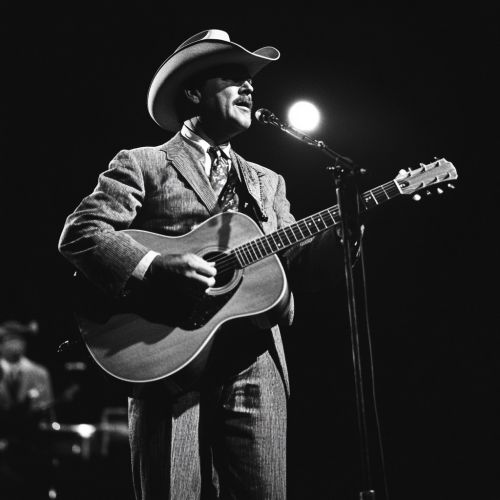Hank Williams: Difference between revisions
(Created page with "== Early Life and Background == Hiram "Hank" Williams was born on September 17, 1923, in Mount Olive, Butler County, Alabama. He was the third child of Jessie Lillybelle "Lillie" Skipper and Elonzo Huble "Lon" Williams, a railroad engineer. His early years were marked by the absence of his father, who was hospitalized for an extended period due to a brain aneurysm. This left Lillie to raise Hank and his siblings alone. Lillie was a significant influence on H...") |
No edit summary |
||
| Line 46: | Line 46: | ||
* [[Honky-Tonk|Honky-Tonk]] | * [[Honky-Tonk|Honky-Tonk]] | ||
[[Image:Detail-98169.jpg|thumb|center|Hank Williams performing on stage with a guitar, wearing a cowboy hat and suit.]] | |||
[[Category:American Country Musicians]] | [[Category:American Country Musicians]] | ||
[[Category:1923 Births]] | [[Category:1923 Births]] | ||
[[Category:1953 Deaths]] | [[Category:1953 Deaths]] | ||
Revision as of 17:45, 8 October 2024
Early Life and Background
Hiram "Hank" Williams was born on September 17, 1923, in Mount Olive, Butler County, Alabama. He was the third child of Jessie Lillybelle "Lillie" Skipper and Elonzo Huble "Lon" Williams, a railroad engineer. His early years were marked by the absence of his father, who was hospitalized for an extended period due to a brain aneurysm. This left Lillie to raise Hank and his siblings alone. Lillie was a significant influence on Hank's early life, instilling in him a love for music and encouraging his musical talents.
Musical Beginnings
Hank Williams' introduction to music came through the church and the radio. He was particularly influenced by the music of Rufus "Tee Tot" Payne, an African American blues musician who taught him guitar and introduced him to the blues. This blend of country and blues would later become a hallmark of Hank's musical style. By the age of 14, Hank had formed his first band, the Drifting Cowboys, and began performing on local radio stations and at various events.
Rise to Fame
In 1946, Hank Williams signed a contract with Sterling Records, where he recorded his first singles. His breakthrough came with the release of "Move It On Over" in 1947, which became a hit on the country charts. This success led to a contract with MGM Records and the release of "Lovesick Blues" in 1949. The song was a massive hit, reaching number one on the country charts and crossing over to the pop charts. This success catapulted Hank Williams to national fame and established him as a leading figure in country music.
Musical Style and Influence
Hank Williams' music is characterized by its emotional depth and simplicity. His songs often dealt with themes of love, heartache, and loneliness, resonating with a wide audience. His distinctive voice and phrasing, combined with his ability to convey deep emotion, set him apart from his contemporaries. Williams' influence on country music is profound, with many artists citing him as an inspiration. His songwriting style, which blended traditional country with elements of blues and gospel, has had a lasting impact on the genre.
Personal Life
Hank Williams' personal life was tumultuous and marked by struggles with alcoholism and health issues. He married Audrey Sheppard in 1944, and the couple had one son, Hank Williams Jr., who would later become a successful country musician in his own right. The marriage was troubled, and the couple divorced in 1952. Williams' health problems, exacerbated by his alcohol abuse, led to frequent absences from performances and strained his professional relationships.
Later Years and Death
Despite his personal struggles, Hank Williams continued to produce hit songs throughout the early 1950s, including "Cold, Cold Heart," "Your Cheatin' Heart," and "I'm So Lonesome I Could Cry." However, his health continued to deteriorate, and he was often unable to perform. On January 1, 1953, Hank Williams died at the age of 29 in the backseat of his car while en route to a concert in Canton, Ohio. The official cause of death was heart failure, likely brought on by a combination of alcohol and prescription drug abuse.
Legacy
Hank Williams' legacy in country music is unparalleled. He is often referred to as the "King of Country Music" and is credited with shaping the genre's modern form. His songs have been covered by countless artists across various genres, and his influence can be seen in the work of musicians from Johnny Cash to Bob Dylan. Williams was posthumously inducted into the Country Music Hall of Fame in 1961, and his music continues to be celebrated and studied by fans and scholars alike.
Discography
Studio Albums
- Hank Williams Sings (1951)
- Moanin' the Blues (1952)
- Honky Tonkin' (1954)
Notable Singles
- "Move It On Over" (1947)
- "Lovesick Blues" (1949)
- "Cold, Cold Heart" (1951)
- "Your Cheatin' Heart" (1952)
- "I'm So Lonesome I Could Cry" (1949)
See Also

